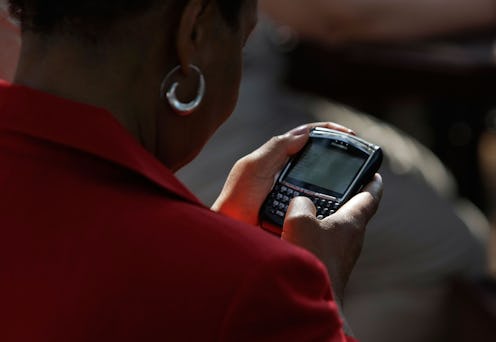Life
How To Become A Crisis Counselor, According To The Crisis Text Line

I think we can all agree that for the most part, our generation is more comfortable texting than talking on the phone. Our disinterest in picking up the phone to talk is so widely shared that there are memes depicting the very dilemma. So, if you're turned off by the phone, the last thing you're going to want to do when you're feeling emotionally distraught is pick it up and call a crisis hotline. That's why crisis text counselors are becoming a prominent option in the mental health intervention space. The people who offer these services know that we're more likely to text for help than call for it, so they've made it easier. What's more, they've made it easier on the counselors, too. How to become a crisis text counselor is actually is not nearly as complicated or intense as you might think.
Bustle reached out to Ashley Womble, Head of Communications for Crisis Text Line to get more information on what they look for in a counselor, who can apply to volunteer, and what to expect. Crisis Text Line is the first ever text-only crisis center, founded by former DoSomething.org CEO Nancy Lublin, who experienced first-hand the need for the service. Teens were literally asking for a national text-in counseling option, and so was genesis of Crisis Text Line. But of course the text line wouldn't be anything without its counselors. The group of people that they've trained be ready on the other end of the phone when you need them the most are the real heart of the company. But a lot of the counselors aren't trained professionals, they're just caring adults who have gone through a training program and really want to help.
Whether you're interested in working in the mental health profession, or are just looking for a way to give back, volunteering to be a text line counselor might be great option you. "You don’t have to have a fancy degree to be a Crisis Counselor. If you have the empathy and willingness to learn, we will train you," Womble encourages. That said, there are a lot of requirements that you'll need to meet to ensure that you're ready to make a difference. "Each volunteer is enrolled in a 30-hour online training program and assigned a coach who teaches you listening, risk assessment, and collaborative problem-solving," Womble says, but she adds that these are skills you can use in IRL, too.
Perhaps the second most important part about being a volunteer is the flexible schedule. If you're up late or are happy to be up late offering your time to the crisis center, they'll be happy to have you. "Crisis doesn’t clock out at 5 p.m. The majority of our texters need help at night, so that’s when we most need volunteers," Womble says. That said, they're still happy to have help during the day. No matter what time you clock in, you'll be working remotely, which makes it an excellent gig for people with busy schedules who still want to give back.
Though you probably didn't even think to ask, Womble says this position comes with perks. "After you’d handled a certain number of conversations, you level up and become eligible for some great extras including a membership to Headspace, Best Buy gift card, and even a trip to Disney!"
As for what volunteers should be prepared to deal with — as some topics might be triggering or outside the realm of your comfort zone — Womble explained that "the majority of our conversation with texters (90 percent of which are under the age of 35) are about depression, relationships, anxiety, school, and suicidal thoughts." Most conversations are about 45 minutes, which means you’ll typically handle three to five conversations during a two hour shift. At the end of every conversation, texters will have the opportunity to share feedback, which will get passed back to you so that you can know how well you did.
Interested? Here's what you'll need to know to get started:
Make Sure You Can Commit To Volunteering Hours
Crisis Counselors commit to 200 total hours of volunteering, scheduling a recommended four hours per week to meet this requirement. These hours do not include the 30 hours of training that you'll have to do before you begin.
Apply Online
To apply, you must be 18 or older and you must have a US Social Security Number. You can live and work wherever you want so long as you have your own personal computer and access to reliable WiFi. Be prepared to submit two references with your application. The application will take about 30 minutes and will require a background check.
Train And Change Lives
Every two weeks, applications are sorted through and you should hear back within that time whether or not you'll be moving forward to the training and on-boarding phase. If you're accepted as a volunteer, you'll move forward into your 30 hour training program. Once you complete the program, you'll be prepped and ready to change lives.